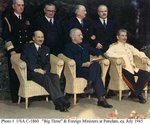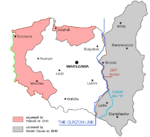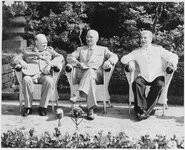syscom3
Pacific Historian
65 years ago on this date, you could argue the the cold war began, even though none of the participants knew it. Untill the fall of the Berlin Wall decades later, the shape of post war Europe was born.
The Potsdam Conference was held at Cecilienhof, the home of Crown Prince Wilhelm Hohenzollern, in Potsdam, occupied Germany, from 17 July to 2 August 1945. Participants were the Soviet Union, the United Kingdom, and the United States. The three nations were represented by Communist Party General Secretary Joseph Stalin, Prime Ministers Winston Churchill[2] and later Clement Attlee, and President Harry S. Truman.
Stalin, Churchill, and Truman — as well as Attlee, who participated alongside Churchill, awaited the outcome of the 1945 general election, and then replaced Churchill as Prime Minister after the Labour Party's victory over the Conservatives — gathered to decide how to administer punishment to the defeated Nazi Germany, which had agreed to unconditional surrender nine weeks earlier, on May 8 (V-E Day). The goals of the conference also included the establishment of post-war order, peace treaties issues, and countering the effects of war.
Potsdam Agreement
At the end of the conference, the three Heads of Government agreed on the following actions. All other issues were to be answered by the final peace conference to be called as soon as possible.
Germany
* Issuance of a statement of aims of the occupation of Germany by the Allies: demilitarization, denazification, democratization, decentralization and decartelization.
* Division of Germany and Austria respectively into four occupation zones (earlier agreed in principle at Yalta), and the similar division of each capital, Berlin and Vienna, into four zones.
* Agreement on the prosecution of Nazi war criminals.
* Reversion of all German annexations in Europe, including Sudetenland, Alsace-Lorraine, Austria and the westernmost parts of Poland
* Germany's eastern border was to be shifted westwards to the Oder-Neisse line, effectively reducing Germany in size by approximately 25% compared to its 1937 borders. The territories east of the new border comprised East Prussia, Silesia, West Prussia, and two thirds of Pomerania. These areas were mainly agricultural, with the exception of Upper Silesia which was the second largest centre of German heavy industry.
* Expulsion of the German populations remaining beyond the new eastern borders of Germany.
* Agreement on war reparations to the Soviet Union from their zone of occupation in Germany. It was also agreed that 10% of the industrial capacity of the western zones unnecessary for the German peace economy should be transferred to the Soviet Union within 2 years. Stalin proposed and it was accepted that Poland was to be excluded from division of German compensation to be later granted 15% of compensation given to Soviet Union.[citation needed]
* Ensuring that German standards of living did not exceed the European average. The types and amounts of industry to dismantle to achieve this was to be determined later (see The industrial plans for Germany).
* Destruction of German industrial war-potential through the destruction or control of all industry with military potential. To this end, all civilian shipyards and aircraft factories were to be dismantled or otherwise destroyed. All production capacity associated with war-potential, such as metals, chemical, machinery etc were to be reduced to a minimum level which was later determined by the Allied Control Commission. Manufacturing capacity thus made "surplus" was to be dismantled as reparations or otherwise destroyed. All research and international trade was to be controlled. The economy was to be decentralized (decartelization). The economy was also to be reorganized with primary emphasis on agriculture and peaceful domestic industries. In early 1946 agreement was reached on the details of the latter: Germany was to be converted into an agricultural and light industry economy. German exports were to be coal, beer, toys, textiles, etc — to take the place of the heavy industrial products which formed most of Germany's pre-war exports.
Poland
* A Provisional Government of National Unity recognized by all three powers should be created (known as the Lublin Poles). Recognition of the Soviet controlled government by the Western Powers effectively meant the end of recognition for the existing Polish government-in-exile (known as the London Poles).
* Poles who were serving in the British Army should be free to return to Poland, with no security upon their return to the communist country guaranteed.
* The provisional western border should be the Oder-Neisse line, defined by the Oder and Neisse rivers. Parts of East Prussia and the former Free City of Danzig should be under Polish administration. However the final delimitation of the western frontier of Poland should await the peace settlement (which would take place at the Treaty on the Final Settlement With Respect to Germany in 1990)
* The Soviet Union declared it will settle the reparation claims of Poland from its own share of the overall reparation payments.
In addition to the Potsdam Agreement, on July 26 Churchill, Truman, and Chiang Kai-shek (the Soviet Union was not at war with Japan) issued the Potsdam Declaration which outlined the terms of surrender for Japan during WWII in Asia.




